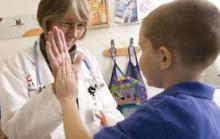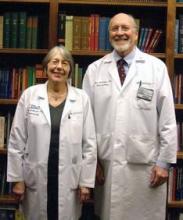They met in a medical school biochemistry class in which the professor arranged the students alphabetically, so that Woodward sat next to Wortmann. In the beginning, their teamwork as study partners earned them excellent grades. But when romance distracted them, they had to study apart. By the second year of medical school Dorothy Woodward and Robert Wortmann were married. That was 42 years ago.
"In college, she was chemistry major and I was biology major. So she did the experiments and I cleaned up afterward. I still do the dishes after meals," according to Dr. Robert Wortmann, who explained that his dish duty originated from a bet over a ski race. "I lost a bet wagering ‘dishes for the year’ when we were in a ski race 35 years ago. She won and has refused a rematch."
Asked to reflect back on his greatest achievement to date, Dr. Robert Wortmann said: "My part in our balancing family and career. We have been married for more than 42 years, we raised two sons who continue make us very proud, and, overall, we have had very satisfying careers. I won’t say it has been easy, but I will say it has been rewarding." Despite that still-lamented ski match, the Wortmanns seem to have had a marriage that has been far more collaborative than competitive, even as they moved several times before arriving in Hanover, New Hampshire, where Robert Wortmann is professor of medicine at Dartmouth and Dorothy Wortmann is a pediatric rheumatologist on the faculty.
Each Wortmann arrived at medical school through a different process. For Robert, becoming a physician may have been a matter of medicine being the family business. "Other than playing professional football, which would have been a goal if I had been bigger, faster, stronger and had any talent (I did play football at Carleton [College, Northfield, Minn.]), I guess I never really considered any alternative to medical school. I don’t think I knew very much about other occupations or professions. My father was a physician and most of our family friends were physicians’ families. Also, I was pretty comfortable in the hospital environment. As I was growing up, my father was in a solo ob.gyn. practice. That meant if I was with him, and he got called to the hospital, I would have to go with him. In those days, they would page doctors at baseball games and come find them in movie theaters. My father used an answering service that he would call hourly whenever he was away from a phone. During the daytime, I usually got to go into the pathology department and always got to see some organs or look at slides. Other times, I would hang out in the doctors’ lounge."
For Dorothy, getting on the road to medical school took imagination, the support of her grandmother, and the enthusiasm of her undergraduate advisers. "I had always expected to go to nursing school. My grandmother, who was my college scholarship, wanted me to get a BA, so I went to Mount Holyoke [College, South Hadley, Mass.], and then my advisers in college encouraged me to go to medical school. My sister was in college and my brother was in graduate school. My father had not planned on sending his daughters to graduate school. He said I could apply for scholarships back East or come to K.U. Medical School, in Kansas City." So the University of Kansas it was, for them both.
After graduation, Robert Wortmann recalled: "We were in one of the first years of the ‘couples match’ for residencies and ended up at the University of Michigan, Ann Arbor, me in medicine and she in pediatrics." Then his obligatory military service reared its head and the couple set off for Korea. If the call had come 5 months earlier, his tour would have been as a medical officer in Vietnam.
From 1973-1974, he served as a general medical officer for the U.S. Army in what was to be the last MASH (mobile army surgical hospital) in Korea. Together, that medical staff of two surgeons, one internist, one anesthesiologist, and 10 nurses cared for 12 helicopter pilots and about 90 enlisted men assigned with them to Camp Mosier, which included the 43rd MASH unit. They also cared for civilians, including residents of a nearby leper colony, as time allowed. Dr. Robert Wortmann’s duties were broad and included "doing sick call and seeing inpatients. I was also No. 3 surgeon, the radiologist, the lab officer, the blood bank officer, the rabies control officer, the VD control officer, the person in charge of doing physical exams on Korean women who were going to marry GIs, and the nuclear holocaust control officer."



